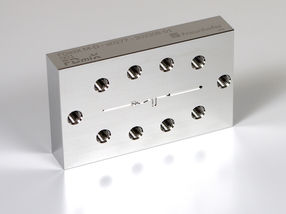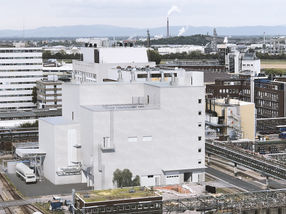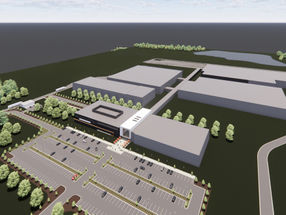Daiichi Sankyo's investments in cancer drugs are taking shape
From Bavaria to the world: Daiichi Sankyo transfers technology for the development and production of antibody-drug conjugates to Germany
Bavaria's Minister President Dr. Markus Söder has marked the start of construction of a building at the production and development site of the Japanese pharmaceutical company Daiichi Sankyo in Pfaffenhofen (Ilm) with a symbolic ground-breaking ceremony, where so-called antibody drug conjugates (ADCs) will be produced in the future.
ADCs are monoclonal antibodies that are combined with a cytotoxic agent (the pharmaceutically active ingredient) to treat people with certain types of cancer in a targeted manner. Earlier this year, Daiichi Sankyo announced plans to invest around EUR 1 billion over the next few years to transform its site into an innovation and production center. The construction of the new building is an important milestone in this plan.
At one of Daiichi Sankyo's largest global production and development sites, the company is significantly expanding its global capacity for the production of cancer drugs. The Pfaffenhofen plant thus makes an important contribution to Daiichi Sankyo's vision of becoming an innovative global healthcare company that contributes to the sustainable development of society. In addition to new oncological therapies, the Pfaffenhofen site continues to produce cardiovascular drugs for Germany and the international market.
Commitment to Bavaria and Germany as a preferred location
"We are delighted that our investments are beginning to take shape, namely in the form of buildings and facilities that will help us develop and manufacture medicines," says Nora Urbanetz, Head of the Technology Unit at Daiichi Sankyo Europe. "Our goal is to help people with certain types of cancer around the world. Today's ground-breaking ceremony is a milestone here in Pfaffenhofen and for Daiichi Sankyo as a whole: by expanding our activities in the heart of Bavaria, we are making a significant contribution to making our medicines available worldwide and delivering them reliably."
The investments in new buildings and facilities for cancer drugs are also an important confirmation of Daiichi Sankyo's commitment to Germany and in particular to Bavaria as one of the pharmaceutical company's preferred locations.
"This is a strong signal for Bavaria as a pharmaceutical location in economically difficult times," said Minister President Dr. Markus Söder in his speech. "Research and technology are the only answers to future challenges. In diseases such as cancer, innovative new treatment methods can prolong lives and improve quality of life. As the Free State of Bavaria, we are supporting this: with our Hightech and Highmed Agenda, we are investing almost six billion euros in future technologies, of which around 500 million euros are in biotech. We are networking universities and companies and creating an innovative ecosystem with completely new opportunities."
Daiichi Sankyo Europe currently employs more than 800 experts at the Pfaffenhofen site and plans to hire up to 350 more employees by 2030 for current and planned expansions.
Note: This article has been translated using a computer system without human intervention. LUMITOS offers these automatic translations to present a wider range of current news. Since this article has been translated with automatic translation, it is possible that it contains errors in vocabulary, syntax or grammar. The original article in German can be found here.
Other news from the department manufacturing
Most read news
More news from our other portals
See the theme worlds for related content
Topic world Antibodies
Antibodies are specialized molecules of our immune system that can specifically recognize and neutralize pathogens or foreign substances. Antibody research in biotech and pharma has recognized this natural defense potential and is working intensively to make it therapeutically useful. From monoclonal antibodies used against cancer or autoimmune diseases to antibody-drug conjugates that specifically transport drugs to disease cells - the possibilities are enormous

Topic world Antibodies
Antibodies are specialized molecules of our immune system that can specifically recognize and neutralize pathogens or foreign substances. Antibody research in biotech and pharma has recognized this natural defense potential and is working intensively to make it therapeutically useful. From monoclonal antibodies used against cancer or autoimmune diseases to antibody-drug conjugates that specifically transport drugs to disease cells - the possibilities are enormous























































